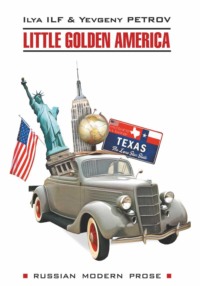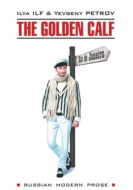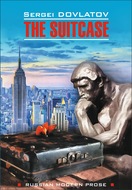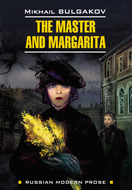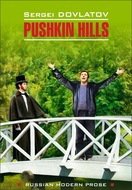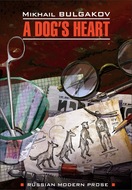Kitabı oku: «Одноэтажная Америка / Little Golden America», sayfa 3
5. We Seek an Angel Without Wings
TIME PASSED. We were still in New York and did not know when or whither we should proceed. Yet, our plan included a journey across the entire continent, from ocean to ocean.
That was a fine, but essentially a quite indefinite, plan. We had made it up in Moscow and had discussed it ardently all the way to America.
We paced scores of kilometres over the decks of the Normandie damp with ocean spray, arguing about the details of that journey and dousing each other with geographic nomenclature. At dinner, drinking the pure but weak wine from the cellars of the General Transatlantic Company, we muttered almost senselessly, “Kahleeforneeya,” “Tyekhas,” or something equally beautiful and enticing.
The plan was astounding because of its simplicity. We were to arrive in New York, buy an automobile, and ride, ride, ride until we arrived in California. Then we would turn around and ride, ride, ride until we arrived in New York. It was all simple and wonderful, like an Andersen fairy-tale. “Tra-ta-ta” sounds the klaxon, “tru-tu-tu” sounds the motor, we ride across the prairie, we swing over mountain chains, we quench the thirst of our trusty machine with the icy water of the Cordilleras, and the great Pacific sun casts its blinding brilliance on our tanned faces.
In short, you can see for yourself that we were a bit “touched,” and roared at each other like chained dogs: “Sierra Nevada,” “Rocky Mountains,” and the like.
But when we stepped on American soil everything proved not so simple and not so romantic.
In the first place, Tyekhas is not called Tyekas, but Texas. But that was only half the trouble.
None of our new friends in New York offered any objections to our purchasing an automobile. Travel in one’s own automobile is the cheapest and most interesting means of transportation in the States. Railroad travel would cost several times as much. Besides, you cannot see America from a train window. It is not a writer’s business to do anything of the kind. So, as for the automobile idea, our suppositions met with approval. The difficulty was in finding a man who could go with us. We could not go by ourselves. We knew the English language well enough to engage a room in a hotel, to order a dinner in a restaurant, to go to a cinema and understand the meaning of a picture – knew it even to the extent of conversing about this or that or the other thing with some indulgent person who was not in a hurry to go anywhere— but we knew no more. Yet more was precisely what we needed. Besides there was one other consideration. The American automobile highway is the kind of place where, as the winged word of the chauffeur has it, you ride straight into the open grave. Here you need an experienced guide.
And so, quite unexpectedly, there opened before us an abyss. And we stood on its very edge. We actually needed a man, who:
could drive a machine to perfection;
knew America to perfection, in order to show it to us properly;
spoke English well;
spoke Russian well;
had sufficient cultural background;
had a good character, otherwise he would spoil the journey;
and
did not like to make money.
The last point was obligatory, because we did not have much money. We lacked it to such an extent that, to tell the truth, we had very little of it.
Thus, as a matter of fact, we needed an ideal creature, a rose without thorns, an angel without wings. We needed a complex hybrid: a guide-chauffeur-interpreter-altruist. Michurin himself would have given up. It would have taken scores of years to breed this hybrid.
There was no sense in buying an automobile until we found the appropriate hybrid, yet the longer we stayed in New York the less money we had left for an automobile. We solved this complex problem daily, and yet we could not solve it. Besides, there was almost no time for thinking about it.
On the way to America we did not take into consideration one thing: hospitality, American hospitality. It is limitless and far outstrips everything possible or conceivable of its kind, including Russian, Siberian, and Georgianhospitality. The first American you meet will not fail to invite you to his house or to a restaurant to drink a cocktail with him. At each cocktail party you will find ten friends of your new acquaintance. Each one of them will not fail to invite you to a cocktail party of his own, and each one of these will have ten or fifteen friends. in two days you suddenly acquire a hundred new acquaintances, and within a week several thousand. It is simply dangerous to spend a year in America, because you will be a confirmed drunkard and a kind of Gleb Uspensky tramp.
All the several thousands of our new friends were filled with one desire: to show us everything that we would want to see, to go with us wherever we’d like to go, to explain everything to us that we did not understand. Remarkable people are these Americans. It is pleasant to be friends with them, and it is easy to do business with them.
We were almost never alone. The telephone of our hotel began to ring in the morning, and it rang as regularly as that in an information bureau. In the rare and brief intervals between meetings with necessary and interesting people we dreamed of this ideal creature still out of our reach. Even our amusements were most businesslike, spurred on by such advice as:
“You must see it; otherwise, you will never know America!”
“What? You haven’t been in a burlesque? Well, but then you haven’t seen America! Why, that is the most vulgar spectacle in the world! You can see it only in America!”
“What? You haven’t been to the automobile races? Excuse me, but you don’t know what America is!”
It was on a bright October morning that we made our way by automobile out of New York to an agricultural exhibit in the little town of Danbury, in the state of Connecticut.
We will say nothing here about the roads on which we travelled. That would take time, inspiration, a special chapter.
The red autumnal landscape stretched on both sides of the road. The leafage was red-hot, and when it. seemed that nothing in the world could be redder there appeared another grove of maddeningly Indian colour. That was not the design of the forest around Moscow, to which our eyes were accustomed, where you will find red and bright yellow and soft brown. Here everything flamed as in a sunset, and this amazing conflagration around New York, this Indian sylvan gorgeousness, continued all through October.
A roar and a clatter was heard as we approached Danbury. The flock of automobiles rested on the slopes of a little valley that was still green. There the exhibit was laid out. Policemen stretched out their arms forbiddingly, chasing us from one place to another. We finally found a place for the automobile and went to the stadium.
At the round tribune the roar was heart-rending, and over the high walls of the stadium flew small stones and hot sand, thrown up by machines around the sharp turn. It would have been easy to lose an eye or a tooth. We hastened our footsteps, shielded ourselves with our arms, just as the Pompeians must have done when their native city was perishing in a volcanic eruption.
We had to wait in a small queue to buy tickets. Around us was the clatter of a drab, provincial fair. The vendors, who have been described more than once by O. Henry, loudly praised their wares: strange aluminium whistles, carved swagger sticks, sticks crowned with dolls, all the trash found at a fair. A cow with beautiful eyes and long eyelashes was being led away. The beauty swung her udder enticingly. The owner of the mechanical organ danced to the tune of the deafening music of his contraption. A swing in the shape of a boat attached to a green metallic rigging made a complete circle. When those who were swinging were high in the sky, their heads down, the pure-hearted and hysterical feminine scream that broke forth carried us at once from the state of Connecticut to the state of Moscow, to the Park of Culture and Rest. The vendors of salted nuts and cheese-cracker sandwiches yelled at the top of their voices.
An automobile race is an empty spectacle, dreary and morbid. Red, white, and yellow racing machines with straddling wheels and numbers painted on the sides, shooting out like rocket volleys, flew past us. One round was succeeded by the next. Five, six, sometimes ten,machines competed at the same time. The audience roared. It was frightfully boring. The only thing that could possibly amuse the public would be an automobile accident. As a matter of fact, that is what people came here for. At last it occurred. Suddenly, alarm signals were heard. Everyone jumped from his seat. One of the automobiles flew off the track while going full-speed. We were still pushing our way through the crowd which surrounded the stadium when we heard the frightful baying of the ambulance. Through its window-panes we managed to see the injured driver. He no longer wore his leather helmet. He sat there, holding on to his blue skull with both hands. He had an angry look. He had lost the prize for which he had risked his life.
In the intervals between heats, on a wooden platform inside the circle, circus comedians were playing a scene which portrayed four clumsy fellows building a house. Naturally, bricks fell on the four fools. They smeared each other with the cement mixture. They beat each other with hammers by mistake, and in sheer self-forgetfulness sawed off their own legs. All this concoction of tricks, which had its origin in the distant antiquity of Greece and Rome and is still brilliantly carried on by such great master clowns as Fratellini, was excellently done by the clowns of the Danbury fair. It is always pleasant to watch good circus work, and its ways, polished through ages, are never boresome.
The fair came to an end. The visitors in the wooden pavilions were few in number. On long tables in the pavilions lay large lacquered vegetables that seemed inedible. The orchestras performed farewell marches, and all the visitors en masse, raising clouds of dust over the clean dark yellow sand, made their way to their automobiles. Here were demonstrated (and sold, of course) trailers for automobiles.
Pairs of Americans, in most cases composed of man and wife, would go inside and exclaim for a long time, impressed by the trailers. They examined the enticing inside of the trailer, the comfortable beds, the lace curtains on the windows, the couch, the convenient and simple metal stove. What could be better? You attach a trailer like that to an automobile, drive out of the thundering city, and drive and drive to wherever your eyes may lead you. That is, you know where you are driving. The eyes “look into the forest,” and they see the Great Lakes, the beaches of the Pacific Ocean, the canyons, and the broad rivers.
Groaning, man and wife would crawl out of a trailer. It was too expensive. Here in Danbury were trailers at $350 and some at $700. But where can you get $700? Where can you get the time for a long trip?
The long columns of machines flew soundlessly back to New York, and after an hour and a half at a good clip we saw the flaming sky. Skyscrapers shone from top to bottom. Over the earth gleamed the flowing lights of the cinemas and the theatres?
Carried away by the storm of life, we decided to devote the evening to acquaintanceship with entertainment for common people.
A “nickel” is what Americans call a small nickel coin of five cents. With all its appearance nocturnal New York tells the pleasure-seeker:
“Give me your nickel! Drop your nickel! Part with your nickel and you will be happy!”
The clicking noise comes out of the large amusement stores. Here stand scores of pinball tables of all kinds. You drop a nickel in the proper slot; automatically a cue is liberated by a spring, and the pleasure-seeker, having decided to spend the evening in revelry, can shoot a steel ball five times. For a certain number of points won he receives a card-board certificate from the master of the establishment. A half-year spent at regular play and, in consequence of the regular dropping of nickels, the reveller has the necessary number of points to receive his prize – one of those beautiful prizes that stand on the shelf. That may be a glass vase or an aluminium cocktail-shaker, or a table clock, or a cheap fountain pen or safety razor. In brief, here are all the treasures at the mere sight of which the heart of a housewife, a child, or a gangster contracts with sweetness. Americans spend hours in such lonely entertainment, in a concentrated, indifferent manner, without anger and without exultation.
Having finished with the pinball, one may go to an automatic soothsayer. She sits in a glass case, yellow-faced and thin. Before her in semicircle lies cards. It is taken for granted that you must drop a nickel. Then the soothsayer comes to life. Her head begins to bob, her chest to heave, and a wax arm glides over the cards. This is no spectacle for impressionable people. It is all so stupid and so horrible that one is in danger of losing one’s mind. A half-minute later the fortune-teller freezes into her previous position. Now you must pull a handle. From the crack falls the prophecy of your fate. It is in most cases a portrait of your future wife and a short description of her attributes.
The stores of these idiotic wonders are disgusting even when they are located in the centre of a city full of tinsel and noise. But somewhere on the East Side, in the dark alleys, where the sidewalks and pavements are littered with the refuse of the daytime trade, among signboards which testify to the extreme poverty (here you can get a shave for five cents, lodging for fifteen), such a store, dimly lighted, dirty, where two or three figures silently and joylessly click at pinball, where by comparison an ordinary game of billiards becomes a genuine triumph of culture and intellect – there it is mortal boredom.
The head can ache from work. But it can also ache from amusement.
After the amusement stores we found ourselves in another strange amusement establishment.
The clatter of jazz imitates so far as possible the clatter of the elevated railway. People crowd around a glass booth in which sits a live cashier girl with a set, waxy smile on her face. This is a theatre called “Burlesque”. This is a variety show for thirty-five cents.
The hall was full, and the young, determined ushers placed people anywhere at all. Some did not find seats. They stood in the aisles without taking their eyes off the stage.
On the stage a woman sang. She did not know how to sing. She bad the kind of voice that did not entitle her to hold forth even at birthday parties for the most indulgent relatives. She also danced. One did not have to be a balletomane to realize that this person would never become a ballerina. Yet the public smiled approvingly. Apparently in this audience there were no fanatics of singing and no balletomanes. The audience had come here for something else.
The “something else” was explained when this singer of songs and dancer of dances suddenly began to tittup across the stage, casting off her clothes as she cut her capers. She cast them off quite slowly so that the audience might examine this artistic mise en scene in all its detail. Suddenly the jazz cackled, the music stopped, and with a bedroom scream the girl ran into the wings. The young men who filled the hall applauded enthusiastically. A master of ceremonies, a man of athletic appearance dressed in a dinner jacket, came out on the stage and made a businesslike proposition:
“If you applaud harder she will take off something else.”
Such an explosion of applause broke loose then as even Mattia Battistini or Anna Pavlova or Keane himself, the greatest of the great, could never expect in a lifetime from any audience. No! Mere talent cannot win such a public!
The performer again passed across the stage, sacrificing what little was left of her garments. To satisfy the theatre censorship, she held a bit of clothing before her with one hand.
After the first dancer and singer another came out and repeated exactly what her predecessor had done. The third one did what the second had done. The fourth, fifth, and sixth did not make any new contributions. They sang without voice and without ear, and they danced with the grace of a kangaroo. But they disrobed. The other ten girls took their turns in faithfully repeating the same performance.
The only difference between them was that some were brunettes (these were fewer in number), while others were light-haired lambs (there were more of these).
This Zulu solemnity continued for several hours. It is pornography mechanized to such an extent that it acquires a kind of industrial and factory character. There is as little eroticism in this spectacle as in a serial production of vacuum cleaners or adding machines.
A small soundless rain fell on the street. But had there been a storm with thunder and lightning it would not have been heard.
New York itself thunders and gleams much more thoroughly than any storm. It is an excruciating city. It constantly rivets all attention to itself. It makes your eyes ache.
Yet it is impossible not to look upon it.
6. Papa and Mamma
BEFORE DEPartING from Moscow we had collected numerous letters of introduction. It was explained to us that America was the land of letters of introduction. Without them you could not turn around.
Americans of our acquaintance whom we visited before departure at once and in silence sat down at their typewriters and began to pound out:
“Dear Sir: My friends, whom I commend to your attention…”
And so on and so forth. “Regards to your wife”—and in brief all that is proper to write on such occasions. They knew beforehand what we had come for.
The correspondent of the New York Times, Walter Duranty, wrote with incredible speed, taking the cigarette out of his mouth only in order to swallow some Crimean Madeira. We carried away from him a dozen letters. In farewell he told us:
“Go, go to America! It is much more interesting there now than here in your Russia. With you everything goes up.” He indicated with his hand the rising steps of a stairway. “With you here everything is clear. But with us everything is not yet clear. And no one knows what may happen.”
A colossal catch awaited us at Louis Fischer’s, a journalist well known in American left-wing circles. He spent at least half of his working day on us.
“You are threatened in America,” he said, “with the danger of finding yourself at once in radical and intellectual circles, getting lost there, seeing nothing, and returning home with the conviction that all Americans are very progressive and intellectual people. Yet it is far from the truth. You must see as many different kinds of people as possible. Try to see rich people, the unemployed, officials, farmers. Look for average people, because it is they who make up America.”
He regarded us with his black and kindly eyes and wished us a happy and fruitful journey.
We were in the throes of greed. Although our suitcases were bulging with letters, it seemed to us that we did not have enough of them. We recalled that Eisenstein had at one time been in America, so we went to see him at Potylikha.
This famous cinema village is laid out on the picturesque shores of the Moskva River.
Eisenstein lived in a small apartment in the midst of chandeliers and huge Mexican hats. In his workroom was a good grand piano and the skeleton of a child under a bell glass. In the reception-rooms of famous physicians bronze clocks usually stand under such bell glasses. Eisenstein greeted us in his green-striped pajamas. He spent the whole evening writing letters, told us about America, regarded us with his childlike, crystal-clear eyes, and treated us to jam.
After a week of hard labour we were the possessors of hundreds of letters addressed to governors, actors, editors, senators, a woman photographer, and simply kind people, including a Negro minister and a dentist from Proskurov.
When we showed all this harvest, garnered after arduous labour, to Jean Lvovich Arens, our consul-general in New York, he turned pale.
“In order to see every one of these people separately… you will need two years.”
“What shall we do, then?”
“The best thing you could do would be to put all these letters back into the suitcase and go back to Moscow. But since you are already here, we’ll have to think up something for you.”
Subsequently we convinced ourselves more than once that the consul could always think up something whenever it was necessary. On this occasion he thought up something grandiose: to send all these letters to their proper addresses and to arrange a reception for all at once.
Three days later, on the corner of Sixty-first Street and Fifth Avenue, in the salons of the consulate, a reception was held. We stood on the landing of the stairway at the second floor. Its walls were hung with immense photographs of the Dnieper Hydro-electric Station, the harvesting of grain with combines, and children’s creches. We stood beside the consul and with undisguised fear looked at the ladies and gentlemen who were walking up from below. They moved in an uninterrupted flow for two hours. These were the spirits called forth by the united efforts of Duranty, Fischer, Eisenstein, and a score of other of our benefactors. The spirits came with their wives – and were in excellent spirits. They were full of eagerness to do everything they had been asked to do in the letters, and to help us learn what the United States was like.
The guests greeted us, exchanged a few remarks, and passed into the salons, where there were bowls of claret cup and small diplomatic sandwiches.
In the simplicity of our souls we thought that when all would come together we, the reason for the occasion, if one may so, would follow into the salon and also raise cups and eat small diplomatic sandwiches. But that is not what happened. We learned that we were supposed to stand on the landing until the last guest departed.
From the salons came gay laughter and noisy exclamations, while we stood endlessly, greeting the late-comers, seeing off those who were departing, and in every other way fulfilling the function of hosts. More than a hundred and fifty guests had gathered, and in the end we did not even manage to find out which of them was a governor and which the native of Proskurov. It was a notable company of grey-haired ladies in spectacles, pink-cheeked gentlemen, broad-shouldered young men, and tall thin young ladies. Since every one of the spirits conjured out of our envelopes represented an indubitable point of interest, we deeply regretted the impossibility of talking at length with each and every one of them.
Three hours later the stream of guests was directed down the stairway.
A fat little man with a clean-shaven head on which glistened large beads of icy sweat came up to us. He regarded us through the magnifying lenses of his spectacles, shook his head, and with much feeling said in fairly good Russian:
“Oh, yes, yes! That’s all right! Mr. Ilf and Mr. Petrov, I have received a letter from Fischer. No, no, don’t tell me anything. You don’t understand. I know what you need. We’ll meet again.”
He disappeared, small, compact, with a remarkably strong, almost an iron body. In the confusion of bidding farewell to guests we could not talk with him and puzzle out the meaning of his words.
Several days later, when we were still lounging in our beds, thinking about where at least we would find the ideal creature so indispensable to us, the telephone rang and the voice of a stranger told us that Mr. Adams was speaking and that he wanted to come right up to see us. We dressed quickly, wondering who Mr. Adams was and what he wanted of us.
Into our hotel room entered the same fat little man with the iron body whom we had seen at the reception in our consulate.
“Gentlemen,” he said, without any preliminaries, “I want to help you. No, no, no! You don’t understand. I regard it as my duty to help every Soviet person who comes to America.”
We asked him to sit down, but he refused. He ran through our small hotel rooms, pushing us now and then with his hard, protruding stomach. The three lower buttons of his vest were unbuttoned and the tail of his necktie stuck out.
Suddenly he cried:
“I am beholden for much to the Soviet Union. Yes, yes, very much! No, don’t talk; you don’t even understand what you are doing there in your country!”
He became so excited that by mistake he jumped out through the open door and found himself in the hall. We had quite a time of it, dragging him back into our room.
“Were you ever in the Soviet Union?”
“Surely!” cried Mr. Adams. “Of course! No, no, no! Don’t say, “Were you ever in the Soviet Union!” I lived there a long time. Yes, yes, yes! I worked in your country for seven years. You spoiled me in Russia. No, no, no! You cannot understand that!”
Several minutes of association with Mr. Adams made it clear to us that we do not understand America at all, that we do not understand the Soviet Union at all, and that in general we understand nothing of anything at all, like newborn calves.
But it was quite impossible to be annoyed with Mr. Adams. When informed of our intention to undertake an automobile journey through the States, he cried: “Surely!” and attained such a state of excitement that he suddenly opened the umbrella which he carried under his arm and for some time stood under it, as if protecting himself from rain.
“Surely!” he repeated. “Of course! It would be foolish to think
that you could find out anything about America by sitting in New York. Isn’t it true, Mr. Ilf and Mr. Petrov?”
Much later, when our friendship had deepened considerably, we noticed that Mr. Adams, after expressing any thought, always demanded confirmation of its correctness and would not rest until he received that confirmation.
“No, no, gentlemen! You don’t understand anything! We need a plan! A plan for the journey! That’s the main thing! And I will make that plan for you. No, no, don’t talk! You cannot possibly know anything about it!”
He suddenly took off his coat, pulled off his spectacles, flung them on the couch (later he looked for them in his pockets for about ten minutes), spread an automobile road map of America on his lap, and began to trace curious lines on it.
Right there before our eyes he was transformed from a wild eccentric into a businesslike American. We exchanged glances. Was this not perchance the ideal creature of whom we had dreamed? Was this not the luxuriant hybrid which even Michurin and Burbank together could not have brought forth?
In the course of two hours we travelled over the map of America. What an exhilarating occupation that was!
For some time we discussed the advisability ofdriving into Milwaukee, in the state of Wisconsin. There you find at once two La Follettes, one a governor and one a senator, and it was possible to get letters of introduction to both of them. An enviable situation! Two Muscovites sit in New York and decide the question of a journey to Milwaukee. If they like, they’ll go there; if not, they won’t!
Old man Adams sat there, calm, clean, self-contained. No, he did not recommend that we go to the Pacific Ocean by the northern route through Salt Lake City, the city of the salt lake. By the time we arrived there, the mountain passes might be in snow.
“Gentlemen!” exclaimed Mr. Adams. “This is very, very dangerous. It would be foolish to risk your lives. No, no, no! You cannot imagine what an automobile journey is.”
“But the Mormons?” we moaned.
“No, no! Mormons – that is very interesting. Yes, yes, Mormons are the same Americans as others. But snow – that is very dangerous!”
How delightful it was to talk of dangers, of mountain passes, of prairies! But even more delightful was it to calculate, pencil in hand, the extent to which an automobile was cheaper than going by railway, the number of gallons of petrol needed for a thousand miles, the cost of dinners, of a modest dinner for a tourist. For the first time we heard the words “camp” and “tourist-room”. Although we had not yet begun the journey we were already concerned about keeping expenses down, and although we had no automobile we were already concerned about greasing it. We began to regard New York as a dark hole from which we must forthwith escape.
When our elated discussion passed into the stage of incomprehensible shouts, Mr. Adams suddenly jumped off the couch, caught his head in his hands, squinted in dumb desperation, and stood like that for a full minute.
We were frightened.
Without opening his eyes, Mr. Adams began to knead his head in his hands and to mutter:
“Gentlemen, everything is lost! You don’t understand anything!”
And then what we did not understand became clear. Mr. Adams had come here with his wife and, having left her in their automobile, had run up to see us for just a second in order to ask us to his house for lunch. He had run in for just a second!
We raced down the corridor, frightening the old ladies who always populate American hotels. In the elevator Mr. Adams jumped with impatience, so eager was he to reach the protective wing of his wife.
Around the corner from Lexington Avenue, on Forty-eighth Street, in a neat but no longer new Chrysler sat a young lady who wore the same kind of protruding spectacles as did Mr. Adams.
“Becky!” groaned our new friend, stretching forth his fat little arms toward the Chrysler.
In the confusion his hat flew off and his round head glistened in the reflected light of New York’s autumn sun.
“And where is the umbrella?” asked the lady, smiling wanly.
The sun went out on the head of Mr. Adams. He forgot the umbrella in our room, he forgot his wife in the street, the umbrella was upstairs. Under such circumstances occurred our meeting with Mrs. Rebecca Adams.
With bitterness we noticed that it was not Mr. Adams, but his wife, who took the wheel. We again exchanged glances.
